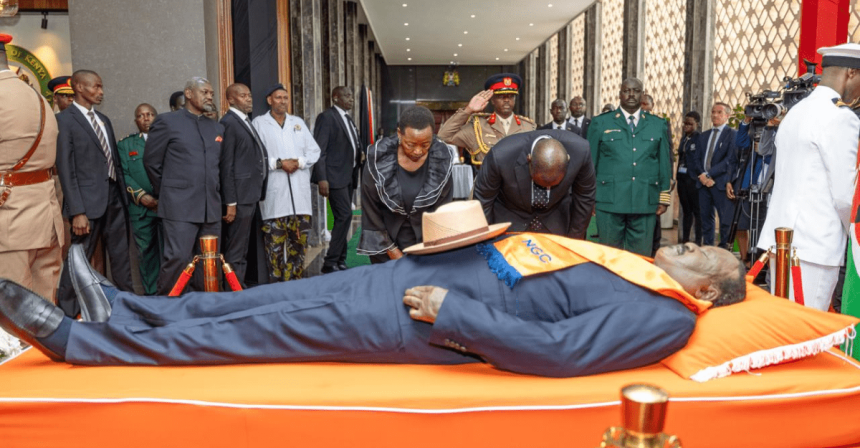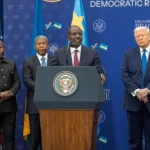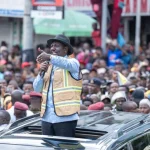The Final Journey: Arrival, Crowds, Chaos
On October 15, 2025, Kenya lost one of its most formidable political figures. Raila Odinga, age 80, died of cardiac arrest in India, where he had been seeking medical care. The Guardian+2Reuters+2 His death triggered a wave of national sorrow — but also exposed underlying tensions in governance, security, and public order.
When his body was repatriated, thousands of mourners stormed Jomo Kenyatta International Airport in Nairobi, overwhelming security protocols and halting operations for hours. Reuters The crowd, carrying flags, twigs, and portraits, surged forward when the coffin was being unloaded. Officials later moved the public viewing from Parliament to Moi International Sports Centre (Kasarani) to accommodate the large turnout. Wikipedia+2Reuters+2
At the public viewing, violence erupted. Security forces fired into the air and used tear gas to disperse the surging crowd, leading to stampedes, injuries, and deaths. Reuters+4AP News+4Reuters+4 Aid groups later confirmed two fatalities and nearly 200 injured during the stampede at the stadium. Reuters+1 Hospitals reported 17 people hospitalized in the chaos. Reuters Earlier, during another viewing session, 3 to 4 people died as crowds pushed gates and security responded forcefully. Reuters+2AP News+2
Heavy Security, Tightened Measures
Given the scale of public reaction, the state funeral was conducted under heavy security. Roads were blocked, media access was restricted, and authorities maintained a tight perimeter around Parliament and the stadium. Reuters The flag at many government buildings flew at half-mast, and seven national days of mourning were declared. The Guardian+2Reuters+2
Some political voices criticized the use of force against mourning citizens. Former Justice Minister Martha Karua questioned why police would fire on crowds paying respects, demanding accountability for the actions. Omni The harsh response, especially as some deaths were recorded, has sparked national debate over how the state handles public grief and security.
Reactions & Tributes: A Legacy Remembered
Across Kenya and beyond, the passing of Raila Odinga elicited profound grief.
-
President William Ruto described Odinga as a unifier and patriot, declaring him a “man of uncommon courage.” The Guardian+2Reuters+2
-
African leaders such as Samia Suluhu Hassan, Cyril Ramaphosa, and others sent heartfelt tributes, highlighting his impact on democracy and regional politics. The Guardian+2Reuters+2
-
Citizens across Kenya held vigils, marched in the streets, and shared moving tributes on social media under hashtags like #RIPRailaOdinga. Many recalled his struggle for multiparty democracy, his role in the 2010 Constitution, and his resilience in the face of political adversity. The Guardian+2The Guardian+2
In his obituary, The Guardian noted Odinga’s central role in pushing Kenya toward constitutional reform, and his enduring influence even as an opposition figure. The Guardian
Challenges & Questions for Kenya’s Future
Raila’s death opens multiple fault lines and uncertainties:
-
Opposition Leadership Vacuum
With Odinga gone, who will lead ODM or the broader Azimio la Umoja coalition? Figures like Hassan Joho, Wycliffe Oparanya, or Martha Karua are being mentioned, but none have Odinga’s reach or authority. -
Public Security vs. Civil Rights
The violence during his funeral raises questions about state use of force. How will Kenya balance public safety with the right to mourn and protest? -
Political Alliances & Realignment
Following the 2025 pact between Odinga and Ruto, some opposition figures joined government. Now, without their anchor, these alliances may shift again. Will ODM stay in government, return to robust opposition, or fracture? -
Electoral Reforms & Democracy
Odinga was a voice pushing for electoral accountability. Without him, will efforts to reform polling, IRIS, and the IEBC weaken? Or will his legacy inspire a new push?
Final Reflection
Raila Odinga’s death is more than the loss of a political leader — it’s the end of an era in Kenyan politics. His life embodied the struggle for democracy, equality, and justice. Despite never winning the presidency, his influence pulsed through the country’s constitutional and democratic evolution.
As Kenya mourns, the true test now lies ahead: will the nation honor his legacy not merely with words, but with actions — stronger institutions, respectful governance, and space for dissent? Raila may be gone, but the ideals he championed must live on.







